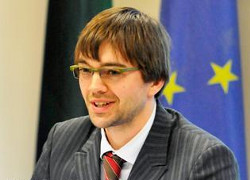Freedom House: There are no sanctions on Belarus
- 3.05.2013, 11:29

The so called sanctions are just restrictive measures.
More than a week passed since the Belarusian-Lithuanian economic forum in Klaipeda. Official media reported for successes and arrangements reached with the Lithuanian side and go on discussing a possible continuation of a “dialogue” with the EU. Meanwhile, an incident with violating Lithuania's airspace by aBealrusian plane occurred, Russia announced its plans to open an airbase in Belarus and Aliaksandr Lukashenka warned that “we will react if Lithuania and Poland have an angry look at us”.
The website charter97.org asked Freedom House to comment on the situation ahead of the Klaipeda forum. Vytis Jurkonis, Project Director at Freedom House office in Vilnius, took some time to think and answered our questions today.
According to him, Lithuanian politicians and civil society of both countries should use such forums to focus on the problems of political prisoners and democracy in Belarus to show the real face of the Belarusian partner. What concerns the release of political prisoners, Europeans have a common opinion on the issue. There are different ways to demonstrate this principled position. For example, Lithuania may invite Ales Bialiatski or the UN Special Rapporteur on Belarus to the Eastern Partnership Summit in Vilnius.
The development of economical cooperation gives the regime a possibility to use the propaganda machine: you see, they are our strategic partners (as Belarus's ambassador to Lithuania said at a press conference in Vilnius ahead of the forum), we have to develop cooperation caring nothing about the political prisoners and so on. What can you say about that?
The Lithuanian-Belarusian economic forum is a worrisome signal especially once Lithuania is approaching the Presidency in the EU. I realize this particular forum is an annual event since 2005, but the visit of the Prime Minister Mikhail Miasnikovich doesn’t look good – the Belarusian state media would definitely use all the opportunities to convince the ordinary Belarusians that the forum is yet another evidence of the recognition.
Nonetheless, I would expect that Lithuanian officials would use this opportunity to amplify the concerns of the democratic world – the release and rehabilitation of the political prisoners, the harassment of the civil society and enormous restrictions of Belarusian independent media.
In addition, I think Belarusian and Lithuanian civil society might have used this event for some public action in Klaipeda – this could be a good occasion to show to international guests the real face of the Belarusian business partner.
How appropriate is such pragmatism in relations between Belarus and Lithuania, as a member of the EU?
David Kramer during his last visit to Vilnius already mentioned that he didn’t envy Lithuania to have such a complicated neighbourhood and that it was hard to expect from the Baltic States to fully cut economic cooperation with the neighbouring Belarus.
Sometimes you have mixed feelings regarding the statements of some politicians, but it is a task for international community and Belarusian civil society to constantly remind that Belarus remains to be a regime country and contacts with the official Minsk should be limited to the minimum.
What can be an instrument for changes?
Frankly speaking the economic forum looks rather awkward in the light of sanctions. However, everyone, especially Brussels, needs to be realistic regarding the EU policy towards Belarus – there are no sanctions in Belarus. The so called sanctions are just restrictive measures, which should be considered to be just a sign of a principled position. It’s a pity, but the regime countries find their ways through illegal trade, corruption etc. Sanctions could be effective if they are consistent and all EU countries comply with this policy.
European politicians, including Lithuanian ones, again started to talk about a possibility for a dialogue with the Belarusian regime which promotes the position that values are different, but interests are common. What do you think about this? How do you see a possible effect of this new-old strategy of the dialogue?
The majority of Lithuanian foreign policy makers and MPs have a firm position – human rights and democracy in Belarus remain on the agenda of Lithuanian foreign affairs. So I truly hope that Europe has learned its lessons from 2009-2010.
Belarusian opposition leaders, such as Andrei Sannikov, continue to say that no talks with the regime are possible while political prisoners are in jail. Europeans (not all of them) say the same, but continue to develop the strategy of a dialogue. How can you explain this two-faced policy?
Politics is not easy, but we should be principled. Everyone in the EU speaks about the immediate release and full rehabilitation of the political prisoners – so the ball is on the Belarusian authorities side.
Nonetheless, I want to stress the importance of the opposition, civil society, independent media inside Belarus – they need to outreach and inform their population as well, otherwise we are choosing only the battles outside Belarus.
How do you see prospects for Belarus in the Eastern Partnership project now when Lithuania is preparing to host the summit in November 2013?
It is still not clear, who is going to represent Belarus during the summit, though it was announced that it’s not going to be a person who is on the EU visa-ban list. However, most likely Makei will be put out of the visa ban list pretty soon.
The president of FH David Kramer suggested Lithuanian officials to invite Ales Bialiatski for instance. Lithuania could consider inviting the UN Special Rapporteur on Belarus Miklos Haraszti. There are options to show a principled position.









